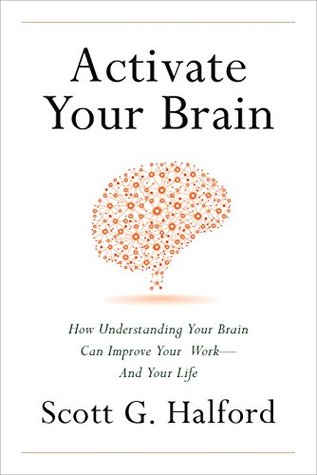More on this book
Kindle Notes & Highlights
Read between
July 2 - August 29, 2019
the brain prompts us to feed it by causing confusion, tiredness, irritability, and a number of other flags.
The average human needs six to eight eight-ounce glasses of water a day for the body to operate properly.
(Cold water helps you burn more calories as your body heats up the liquid—good to know if you’re trying to lose weight.)
body’s way of eliminating toxins.
Carbohydrates are a mainstay for brain activity, but as you might imagine, our marvelous machine needs other foods, too.
Scents are linked to the emotional center of our brain, and—as with music—can immediately transport us to a calmer or more invigorated place, and to many places in between.
provides us with an opportunity to bond with others, to relax, to emote, or to simply escape for a while.
great way to distract ourselves
improve brain performance.
Music can also be a stimulator and can energize us,
interfering with short-term memory.4
how a short amount of time becomes very long when we just slow down? There is a huge lesson in just that one point. If you want more time, slow down occasionally.
One way to get unstuck is by letting your mind wander in a way that can create flashes of insight.
acknowledge and learn from a practice that has been around for literally thousands of years; neuroscience is now showing that those who do it on a regular basis have better memory, less dementia, less overall brain shrinkage, increased cortical thickness, and higher reported levels of fulfillment. That’s some pretty compelling evidence.
releases chemicals in the brain that allow us to refocus and feel more alert, it dulls pain receptors, it helps improve the immune system and heart health, and it feels just plain good.
According to a huge array of studies, exercise is the single best thing we can do for brain health.
learning new things is one form of mental exercise.
Learning new things changes the shape of our brain.
release of a chemical—brain-derived neurotrophic factor, or BDNF—that actually helps our brain to
grow, allowing us to slow down the approximate 0.5 percent annual brain shrinkage we experience after the age of forty.
The benefits of exercise are indisputable. It’s about paying slightly more attention to our body and the brain inside it. When they feel the difference, so do our friends, family, and colleagues.
Unlike the rest of our organs, the human brain is social.1 For instance, we have that ability to “mentalize”—to think about what other people are thinking about—and we have dedicated neuro architecture that activates when we think about other people.
Each interaction we have with another human being literally changes who we are—even if the change is small.
understanding our own significance and helping illuminate it in others.
We are happier and more fulfilled when we’re developing a sense of significance through our connections with others, and when we’re creating feelings of significance in others. Let’s explore how we can do both of those things.
but do you want to at least have a significant impact on your work and your family? If so, it requires awareness of who you are and how you go about interacting every day; you have to live life by design and not by default.
People who have an impact and who create significance are almost always able to create, nurture, and maintain relationships—working through and with others.
We’re wired to work together.
Trust is difficult to build, easy to lose, and really challenging to get back once violated.
Without trust, transparency and vulnerability feel too scary, and so we usually mask our inabilities and don’t bother getting help.
strong ego is like that—it is a gentle one. It doesn’t have to hurt you in order to make its point. It doesn’t have to be right every step of the way, and it looks for win/win situations. The strong ego fully realizes that we’re all unfinished human beings and that together we might actually get something done.
weak ego, on the other hand, is fragile and supremely unconfident. It’s a bully. It’s all right for it to get hurt, just so long as the other person gets hurt more. The weak ego needs to be right at all costs and will own just about every good idea that comes along, because of course, they already had the idea before you or me. The weak ego is brilliant at deflecting blame. It’s defensive. It’s not self-aware, so it doesn’t notice that every time there’s a problem, it happens to be present.
the unworthy and the victim. People
lacking in confidence, timid,
shy, or passive-ag...
This highlight has been truncated due to consecutive passage length restrictions.
Unconfident.
“Me-centric”—
Emotional vampires.
Needy.
Quiet.
Pessim...
This highlight has been truncated due to consecutive passage length restrictions.
Lo...
This highlight has been truncated due to consecutive passage length restrictions.
Socially awkward or do not desire socia...
This highlight has been truncated due to consecutive passage length restrictions.
When you are in a vulnerable situation—sick, fired, demoted, demoralized—surrender to the help you are offered.
Charming—
Abrasive.
B...
This highlight has been truncated due to consecutive passage length restrictions.
Manipul...
This highlight has been truncated due to consecutive passage length restrictions.
Aggressive and passive-a...
This highlight has been truncated due to consecutive passage length restrictions.
Uncon...
This highlight has been truncated due to consecutive passage length restrictions.


